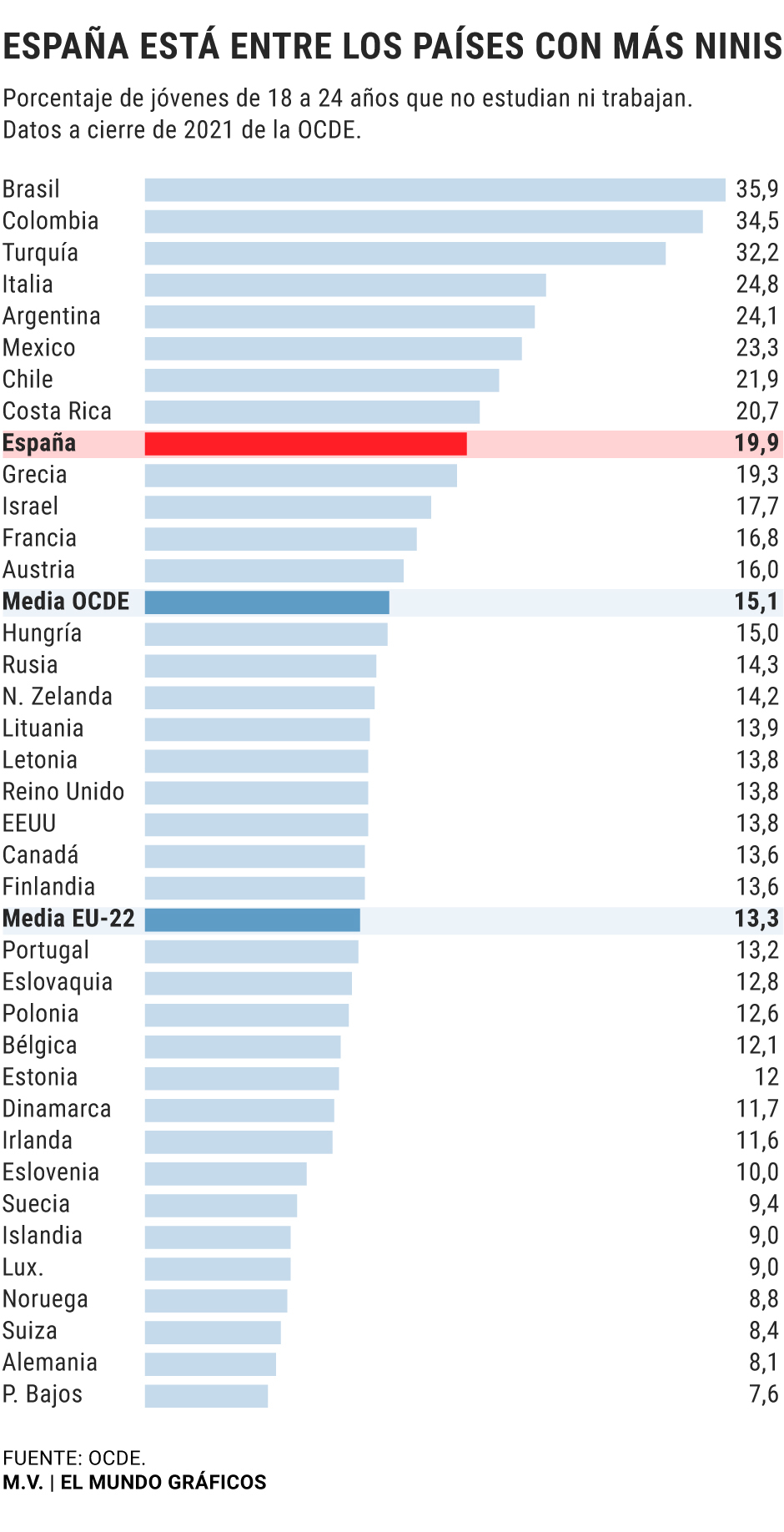Youth unemployment is becoming chronic: Spain has half the number of workers under 30 years of age than in 2007
The recovery of the labor market after covid-19 in Spain has not prevented the
number of young people who neither study nor work
(the so-called '
ninis
') from increasing since 2019 to now account
for 19.9% of the total,
according to the latest
OECD
data
.
This means that one in five young people in Spain between the ages of 18 and 24 are neither in training nor working, a percentage that exceeds the
European Union average (13.3%)
and also that of the
OECD (15. 1%)
.
In fact, at the end of 2021, Spain is
the second country in Europe with the highest proportion of ninis,
only behind
Italy
, where 24.8% of those under 25 years of age do neither.
The best places in the ranking are occupied by
the Netherlands
(with only 7.6% ninis),
Germany
(8.1%),
Switzerland
(8.4%),
Norway
(8.8%) and
Iceland
(9% ).
).
Proportion of NEETs over the total number of young people in OECD countries
The group of ninis includes both young people who are
looking for work
but cannot find a job -and who are listed as unemployed-, as well as those who are
inactive
without looking for work.
Spain draws attention because it is one of the few countries in which there are
more ninis because they cannot find a job
than because of inactivity.
Specifically,
10.7% of the total would like to work,
compared to 9.2% who consider themselves inactive.
This is so due to the
high percentage of youth unemployment
that exists in the country, 29.2% at the end of January 2022, which also places Spain in a leading position compared to the rest of the European countries, only behind
Greece
, with 32.7%.
In fact, while Spain occupies the ninth position in the proportion of ninis within the OECD,
it is the third country
of all those that make up the organization by
number of ninis who are ninis because they cannot find work,
only behind Turkey and Colombia.
Work and study at the same time
Our country is also one of those that has suffered the
greatest increase in the number of NEETs during the pandemic
, since they went from being 19.2% of the total before covid to 22% in 2020, to later drop again in 2021 up to 19.9%.
This increase of 2.8 percentage points in the year of the pandemic placed
Spain
as the
fifth country with the highest increase in NEETs
in the OECD, after Colombia, Canada, the US and Estonia.
The increase in ninis has been parallel to the
decrease in young people who combine work and studies
, which in the last two decades has been reduced from 38% to 16% due to the financial crisis that started in 2008, did not recover afterwards and returned to fall with the pandemic.
"This new decline
further distances us from the countries of northern Europe
in terms of youth employment and training," lament the experts from Fedea, EY and BBVA Research in the 'Human Capital Outlook' report.
Of those under 25 years of age in the country, apart from the 19.9% who are ninis,
50.6% only study
-in Germany, for example, the proportion of those who only study is 30.2%-,
21, 3% only work
and only
8.3% work and study simultaneously
-compared to 33% in Germany-.
According to the OECD,
young women are more likely to become ninis than young men
.
On average, in the countries that make up the organization, the proportion of ninis women is 16.5% compared to 14% of men.
"However, the reasons for being nini are not the same for women as for men. In almost all OECD countries, the majority of
female
ninis are
inactive
, while the majority of
men
who are ninis are because
can't find a job
," they point out.
70% of ninis are inactive, compared to 50% of men.
Conforms to The Trust Project criteria
Know more
Germany
Coronavirus
European Union
job
EmploymentSpain continues to be the EU country with the highest proportion of temporary workers, warns the IMF
Russia-UkraineInflation could skyrocket in Spain to a record 6.5% average in 2022 due to the war
Minimum WageUnemployment of women under 20 years of age, the most affected by the SMI, is 100% in three communities in Spain
See links of interest
Last News
When does the 2021 Income start?
Income 2021
Work calendar 2022
Economy Podcast
Davis Cup, live: Carlos Alcaraz - Marius Copil
DSC Arminia Bielefeld - FC Augsburg
International - Salernitana
Alaves - Seville
Real Zaragoza - Almeria

